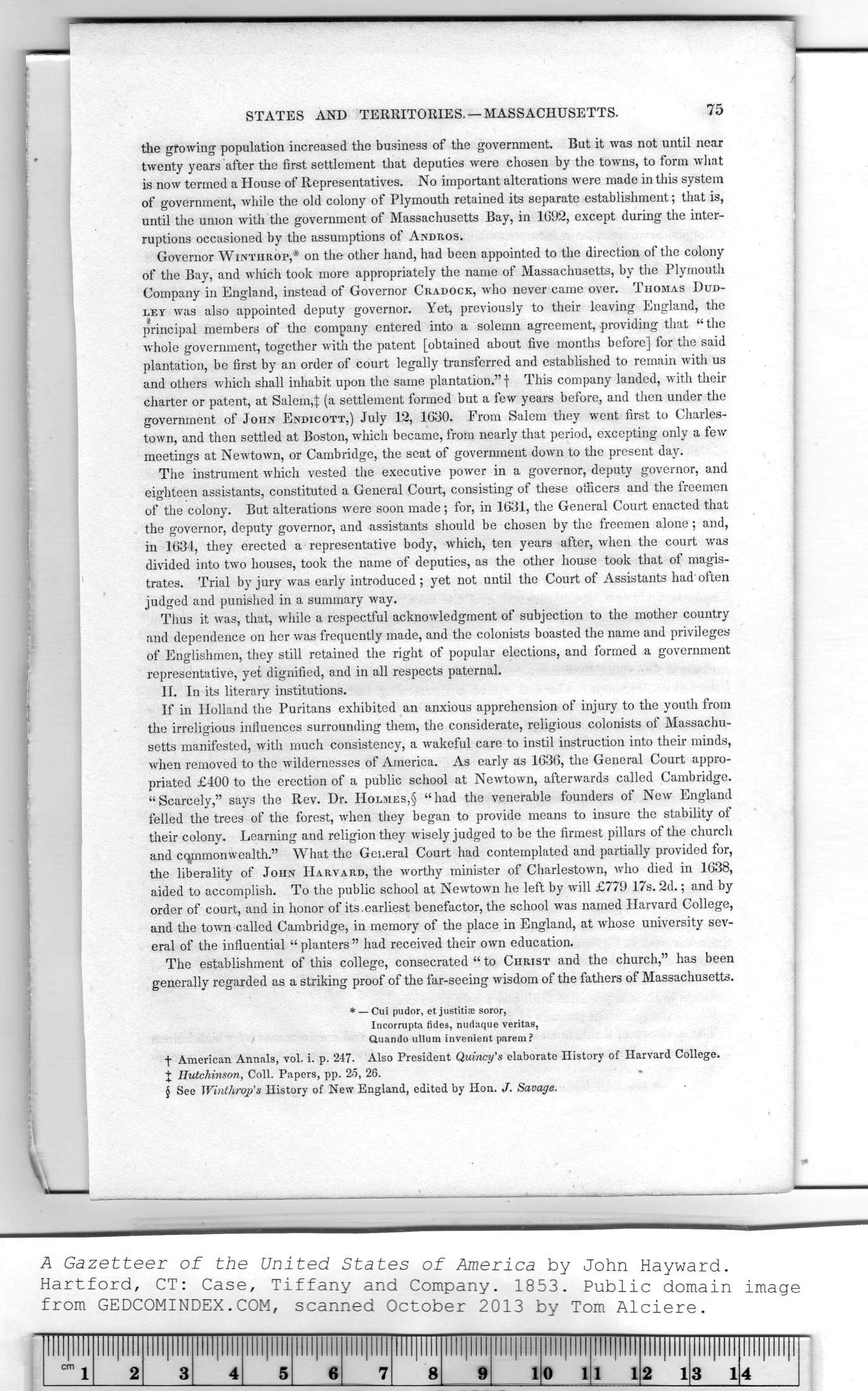|
|
Note: Ctrl and + increases the font size of the text below, Ctrl and - decreases it, and Ctrl and 0 resets it to default size.
STATES AND TERRITORIES. —MASSACHUSETTS. 75
the growing population increased the business of the government. But it was not until near
twenty years after the first settlement that deputies were chosen by the towns, to form what
is now termed a House of Representatives. No important alterations were made in this system
of government, while the old colony of Plymouth retained its separate establishment; that is,
until the union with the government of Massachusetts Bay, in 1692, except during the inter-
ruptions occasioned by the assumptions of Andros.
Governor Winthrop,1 on the other hand, had been appointed to the direction of the colony
of the Bay, and which took more appropriately the name of Massachusetts, by the Plymouth
Company in England, instead of Governor Cradock, who never came over. Thomas Dud-
ley was also appointed deputy governor. Yet, previously to their leaving England, the
principal members of the company entered into a solemn agreement, providing that “the
whole government, together with the patent [obtained about five months before] for the said
plantation, be first by an order of court legally transferred and established to remain with us
and others which shall inhabit upon the same plantation." f This company landed, with their
charter or patent, at Salem,J (a settlement formed but a few years before, and then under the
government of John Endicott,) July 12, 1630. From Salem they wrnnt first to Charles-
town, and then settled at Boston, which became, from nearly that period, excepting only a few
meetings at New'town, or Cambridge, the seat of government down to the present day.
The instrument which vested the executive power in a governor, deputy governor, and
eighteen assistants, constituted a General Court, consisting of these officers and the freemen
of the colony. But alterations were soon made ; for, in 1631, the General Court enacted that
the governor, deputy governor, and assistants should be chosen by the freemen alone; and,
in 1634, they erected a representative body, which, ten years after, when the court was
divided into two houses, took the name of deputies, as the other house took that of magis-
trates. Trial by jury was early introduced ; yet not until the Court of Assistants had often
judged and punished in a summary way.
Thus it was, that, while a respectful acknowledgment of subjection to the mother country
and dependence on her was frequently made, and the colonists boasted the name and privileges
of Englishmen, they still retained the right of popular elections, and formed a government
representative, yet dignified, and in all respects paternal.
II. In its literary institutions.
If in Holland the Puritans exhibited an anxious apprehension of injury to the youth from
the irreligious influences surrounding them, the considerate, religious colonists of Massachu-
setts manifested, with much consistency, a wakeful care to instil instruction into their minds,
when removed to the wildernesses of America. As early as 1636, the General Court appro-
priated £400 to the erection of a public school at Newtown, afterwards called Cambridge.
“Scarcely," says the Rev. Dr. Holmes,§ “had the venerable founders of New England
felled the trees of the forest, when they began to provide means to insure the stability of
their colony. Learning and religion they wisely judged to be the firmest pillars of the church
and cqrnmonwealth." What the General Court had contemplated and partially provided for,
the liberality of John Harvard, the worthy minister of Charlestown, who died in 1638,
aided to accomplish. To the public school at Newtown he left by will £779 17s. 2d.; and by
order of court, and in honor of its.earliest benefactor, the school was named Harvard College,
and the town called Cambridge, in memory of the place in England, at whose university sev-
eral of the influential “ planters " had received their own education.
The establishment of this college, consecrated “ to Christ and the church," has been
generally regarded as a striking proof of the far-seeing wisdom of the fathers of Massachusetts.
A Gazetteer of the United States of America by John Hayward.
Hartford, CT: Case, Tiffany and Company. 1853. Public domain image
1
— Cui pudor, et justitiae soror,
|
